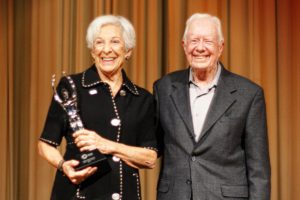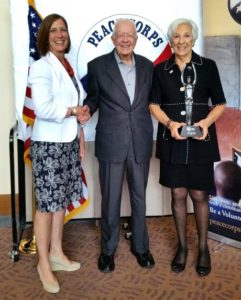2017 Lillian Carter Award given to Leita Kaldi (Senegal)
LEITA KALDI (Senegal 1993–96) worked at the United Nations in New York, UNESCO in Paris, at the Fletcher School of Law and Diplomacy and Harvard University. She then joined Peace Corps and went to Senegal. This year she was awarded the Lillian Carter Award. At the presentation in Atlanta, Leita spoke about her experiences as an older Volunteer in the Peace Corps.
•
WHEN I LEARNED that I was to receive the Lillian Carter Award, I was as overcome with emotion as on that day in 1993 when I was told that I’d been accepted into the Peace Corps. Beside myself with joy!
Thank you, President Carter, for this wondrous award. It’s not surprising that the President would honor his mother so, as he and the Carter Center have been supporting women across the globe for decades, in their struggles not only for equality, but for survival.
I also wish to thank my Returned Peace Corps Volunteer friends of the Gulf Coast Florida and the RPCVs of South Florida for their kind support. I share this award with all of them. Special thanks to my friend, Lillian Baer of RPCVs Seattle, who nominated me. She co-founded Africa Consultants International in Dakar in 1983 with fellow RPCV, Gary Engleberg. They are a legend in Senegal. I’ve been working with ACI for many years now, coordinating their fund-raising campaigns.
Several people have come here to share this joyful event. I’m grateful to Ambassador Leslie Rowe (a forever friend/Miami), Dr. Kim Cole (Boston – Niece of my heart), Lynn Robinson (New York), Maureen O’Hara (UN Women, Sarasota), Pat & Brent Mosher, (RPCV Gulf Coast), Helene Dudley (RPCV South Florida), Tammi Sharpe (UNHCR) whom I haven’t seen since we were Volunteers together in Senegal. And thanks to all the Atlanta RPCVs for creating and guiding me through this amazing ceremony.
I am humbled, though, to receive this great honor, when I think of all the unsung heroes I know who dedicate themselves to humanitarian work, who never seek or gain recognition. I’d like to take a moment to recognize my husband, Robert Davis, who is devoted to serving homeless people, especially children, and who also supports Habitat for Humanity, among other worthy causes. (And takes care of me! No small job)
By the way, congratulations to President and Mrs. Carter on their recent Habitat Humanitarian Award.
READING ABOUT MISS LILLIAN in President Carter’s book, A Remarkable Mother, I found some parallels with my own Peace Corps experience as an older woman.
At the age of 68 Miss Lillian left her family to go to India; I left my two sons when I was 55. We both missed our children. I dare say my heart sank at the prospect of not seeing them for two years, but it soared each morning when Senegalese children clamored past my house on their way to school, or dropped in to drum on plastic buckets, or just sat around, ever curious about what l’Americaine was up to.
There were many advantages to being a Volunteer at my age. In my village we had no electricity or running water. I was growing up before there was TV, in the days of the icebox and the outhouse. So I didn’t miss modern conveniences as much as younger Volunteers who had taken them for granted all their lives.
Being a senior in our group gave me opportunities to mentor those who were having a hard time adjusting to a new culture and figuring out what to do. Many twenty-something volunteers, some of whom remain life-long friends, would come to me for advice, and talk about their quandaries over a beer . . . or two.
In the Indian village of Vikhroli, Miss Lillian found it difficult to learn Marathi and Hindi. Learning a new language at a certain age becomes a tad difficult. Fortunately, she could often fall back on English. So did I struggle with Wolof and Serer. But I spoke French, at least, the colonial language of Senegal. She published a book, Away from Home: Letters to My Family. I kept a diary on which I based my book, Roller Skating in the Desert.
As a nurse, Miss Lillian assisted President Indira Gandhi’s family planning program, though she preferred to treat villagers’ common illnesses. I carried bags of condoms around and counseled young . . . and not so young . . . people about prevention of HIV/AIDS, though I preferred to teach English or work with women’s groups to develop small businesses.
The people I lived among viewed me as a grandmother and respected me accordingly. They found it difficult, though, to understand why a woman my age would travel to a strange land and live alone, instead of surrounding herself with children who would care for her. The women also found it bizarre, in a Muslim polygamist society, that I did not have a husband. So they regularly sought one out for me. I managed to turn their match-making into comedy by commenting that my erstwhile suitor was too old – I was older than any of them – or did not have enough cows. Children called me yaay, and I was expected to keep an eye on them, as the other grandmothers did.
Many years after her service, when President Carter was in office, Miss Lillian represented our government at the funeral of Indian President Fakhruddin. She took the opportunity to return to her village of Vikhroli. Ten thousand people waited to celebrate her. When I returned to Senegal in 2001 there weren’t ten thousand people to welcome me, but there were many who were happy to see me. Several of the projects we had started together had endured. When I returned again in 2005, while they were glad to see their old yaay, they were actually quite surprised that I was still alive!
WHY WOULD WE WANT to join the Peace Corps later in our lives? I think that as we grow older, we start thinking more about “we” than about “me.” I wanted to do something meaningful before it was too late.
In a way, I never left Peace Corps. I spent years writing a book about it, revisiting my adventures, and sharing stories with other RPCVs, collaborating on projects to help our communities, especially people in need. We let them know that Peace Corps is still alive and thriving.
I learned so much from the Senegalese people. Perhaps most important was the concept of teranga, the sharing of whatever one has with others. I learned to share my bread, my space and my strength with people who had less, a concept Miss Lillian followed all her life. In her honor, I gratefully accept this award. Thank you.


No comments yet.
Add your comment